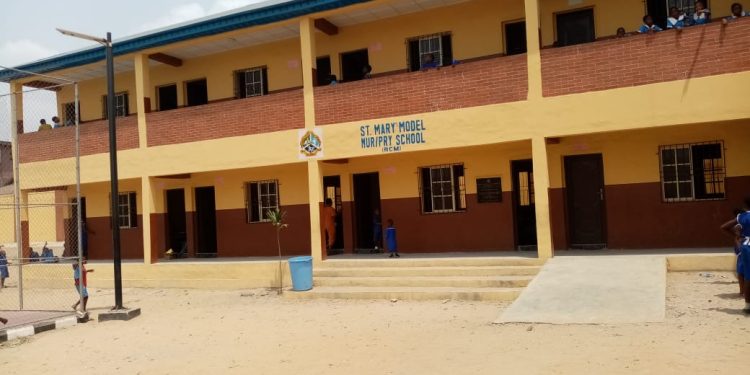Every rainy day is the worst for students and teachers of Cherubim and Seraphim Nursery and Primary school, the first and only public school in Igbo Elejo (Snake Forest) in Amuwo-Odofin area of Lagos State.
The school, founded in 1954 has been neglected for years, making it slips into a deplorable state with falling roofs and flooded environment, whenever it rains. If the downpour starts early in the day, it is automatically a day off for students, while teachers and students would have to find shelter in any classroom that is able to provide a shed should the rainfall happen during school hours. Nevertheless, they would all remain drenched throughout the day.
In spite of the sorry state of this school, it is the only hope for children of the poor and vulnerable residents in the community. This is because many are unable to afford private school education in the neighbourhood.
Schools such as the Igbo Ejo’s are supposed to always be in good condition, kept in good shape, and well-equipped with teaching materials as provided for by the Universal Basic Education (UBE) Act through the UBE Fund. Surprisingly, this has not been the situation in most cases in Nigeria as there are reported cases of diversion of the UBE fund for other purposes.
Inefficient utilization of UBE Funds for Education purposes
The Compulsory, Free Universal Basic Education Act (2004) makes significant provisions to affirm the rights of all children to education. The Act provides adequate financing for education from Primary to Junior Secondary level in Nigeria.
Part III of the Act states “(1) The implementation of the Universal Basic Education shall be financed from – (a) Federal Government block grant of not less than 2 percent of its Consolidated Revenue Fund; (b) funds or contributions in form of Federal guaranteed credits; and (c) local and international donor grants.”
In sub-section 2 and 3, however, the Act states “For any state to qualify for the Federal Government block grant pursuant to subsection 1(1) of this section, such State shall contribute not less than 50 percent of the total cost of projects as its commitment to the execution of the project”; and (in subsection 3) “the administration and disbursement of funds shall be through the State Universal Basic Education Board.”
Since the passage of this law, State Governments through their respective State Universal Basic Education Boards (SUBEBs), set up by the UBE Act, have been accessing this grant as allocated to them from the 2 percent consolidated revenue fund. Till 2018, a good number of states in Nigeria were accessing their share of the grant with their 50 percent commitment as stated in the law without noticeable improvement in the quality of public education.
Meanwhile, the UBE fund is meant to address the challenge of poor basic education infrastructure, especially in rural and hard-to-reach communities across the country, the challenge that has been a contributory factor to the overall poor standard of teaching and learning in Nigeria.
In the face of these UBE interventions and the funds to states, there is hardly any state in the country where dilapidated public schools do not abound, with children of the poor, learning in classrooms without roofs, doors, windows, furniture, as well as other teaching and learning facilities.
The UBE funds have not transformed the public education sector as they should, as oftentimes most states divert the funds to what they consider as vital and important, leaving the education sector to bear the brunt.
Currently, the number of out-of-school children in Nigeria is between 15 and 20 million, and the proliferation of private schools exceeds the available public schools, evidence that education in Nigeria is in dire need of rescue.
It is with the aim of ensuring that the UBE funds are channelled appropriately and add value to children’s education that Human Development Initiatives, an education-focused NGO based in Lagos, decided to intervene by tracking and monitoring how the fund is being expended in Lagos State.
Mrs. Olufunso Owasanoye is the Executive Director of the HDI; she said the research conducted by the organisation showed that the poor state of public education, despite the availability of the UBE fund in Nigeria, is primarily caused by lack of accountability and transparency at the state level, particularly in the utilisation of education funds.
She added that the inability of states to access more funds and increase allocation to education, so as to improve the quality of teaching and learning; as well as the lack of effective community involvement in the governance of education, especially at the local level are challenges against the effort to improve the education system in the country.
Mobilising community members to change the narrative
Meanwhile, in order to address these challenges as it regards the utilisation of the UBE funds for the desired purpose, Owasanoye, the HDI boss, said the initiative adopted a bottom-up approach, and strategically engaged and mobilised community groups including the traditional rulers, artisans and local professionals to raise their awareness about the UBE interventions.
“We engage community members to understand the potential for rapid improvement in quality education service delivery in their communities if they get involved and play their roles in securing the future of their children,” she said.
The strategy deployed by HDI is basically to identify stakeholders in the selected communities across Lagos State, train them on how to monitor specific projects under the UBE Fund, help to produce reports on the status of the projects/schools, and engage the Lagos State Universal Education Board (LASUBEB) with the report, after which LASUBEB would ensure the recommendations in the report are addressed.
“Like every other state in Nigeria, LASUBEB submits an action plan to the Universal Basic Education Commission (UBEC) before they can access the UBE Fund, and the action plan details all approved education projects including the locations of beneficiary schools and the specific project cost.
“We go through the action plan, simplify it and engage community members as monitors to track and monitor the implementation of the projects,” Owasanoye explained.
She claimed that with the right information on education projects assigned to specific communities, as detailed in the simplified action plan mass-produced by HDI, grassroot stakeholders are provided with the needed transparency around the nature and type of projects, expected duration for completion, project cost, the quantity of the project and locations, among other details. This information helps to begin tracking, reporting, and engaging government actors.”
UBE Fund Changing the Tide
In a dramatic turn of situation, the Cherubim and Seraphim Nursery and Primary school, which used to be in very bad shape and in an unconducive environment, has a new set of classrooms and has been renovated following the report of the community monitors on the status of the school to LASUBEB.
Mrs. Olatokunbo Onitiri, one of the HDI’s trained monitors said “before now whenever it rained, it poured on the children and the teachers. At times, two classes would be in a room which shows how poor the situation was.
“But after we realised that there is a provision for school in the UBE fund, we engaged LASUBEB and the school now wear a brand new look with modern school building and facilities.”
Similarly, St. Mary, (R.C.M) Nursery and Primary School, Ajegunle benefitted through the initiative, which a ten-year-old pupil in the school, Chinasa Marcus attested, had been in a deplorable state for years. Fortune smiled on her school in recent years, through efforts confirmed to be through the HDI and community intervention.
“When I woke up those days to go to school, I used to feel sad because I knew that when it rained my book and uniform would be wet; the same way my classroom would be flooded. Even our teachers would have to suspend teaching because everywhere would be so dark. We wouldn’t know what to do,” Marcus explained.
Corroborating how the HDI’s intervention has been helping to drive change in the education sector, Babatunde Soneye, Education Secretary, Kosofe Local Government Education Authority (LGEA) said “HDI is an organisation that specialises in monitoring the effective and efficient utilisation of public funds that are targeted specifically to education projects.
“Since they have been working with the SUBEB and by extension, the LGEA, their activities with us have helped in diverse ways in putting us, as school administrators, who allocate these projects to contractors on our toes so that funds are specifically used towards what they were budgeted for.”
Also, Mrs. Janet Fagorusi, a former Director of the Basic Educational Service Department at the Lagos State Ministry of Education shared that HDI has been working with the Lagos State Government, especially in the training of School-Based Management Committee, and interested community members to ensure good governance of education in the school system.
Hon. Alawiye-King, the Lagos SUBEB Chairman remarked that “HDI has been much concerned about what happens in the basic education sector; they are much more concerned about transparency, accountability, and probity in the way we do things in the basic education sector. They have been there to monitor the programmes, the project, and the plans we have in that sector and that has really put us on our toes.”
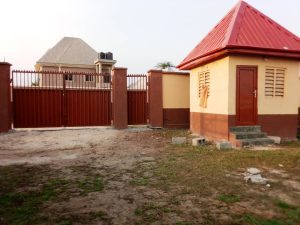
Several schools benefitted
Father Sadiku Primary school and St Mary Model Nursery and Primary school (RCM), Ajegunle were in a state of disrepair when they were Incorporated in the 2016 action plan of the Lagos SUBEB. Nonetheless, the schools did not receive the 100 pieces of furniture, five sets of furniture for the Early Childhood Care and Development Education (ECCDE) sections and 5 sets of Teachers’ furniture allocated to them each in the plan.
When they got wind of this situation, the monitoring teams within the communities reported the case to LASUBEB and the Ajeromi-Ifelodun Local Government Chairman.
“We engaged in a lot of advocacy visits to LASUBEB, and media houses before the renovations were completed in November 2019.
“Thankfully, the once terrible school site now seats 3 important infrastructures all fully equipped with furniture, a Library, Store, Information Communication Technology (ICT) buildings/Centers fully equipped with computers and air conditioners, Generator, a suitable field and playing ground for psychomotor development etc.
“The current School building is categorised as one of the best not just within the local government area but the entire Lagos State,” recounted Mr. Ismail Ashiru, who was one of the monitoring team.
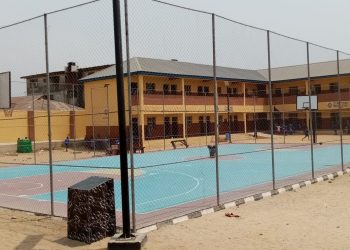
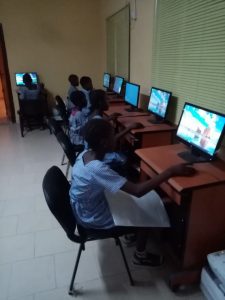
Similarly, Ayekoto Primary School in Imude-Ojo, Ojo LGEA had its abandoned water project completed after the monitoring team observed that there was no borehole in the school, as contained in the 2018 SUBEB action plan.
Mr Segun Aina, one of the community members in Ojo Local Government Area of the state explained how the monitoring team engaged the local chief in the community and LASUBEB officials on the absence of the borehole, despite a provision being made for it in the plan.
“After about four days, the contractor moved to the site and dug one borehole but the Baale did not know. When Baale visited the site himself with some members of the community, he discovered that the borehole was dug in the wrong place and the water was not good for use.
“We engaged the contractor with our observations but for about a month nothing was done about it.
“The Baale called us to report the situation and we escalated the issue through the Project Monitoring WhatsApp platform. The report got to SUBEB and the contractor returned to site and dug a new borehole. Now the borehole project has been completed with a good water supply. The Project has since been inaugurated and handed over to the school,” Aina related.
Saint Michael Primary School, Ojo today has a functional water facility for the pupils due to the intervention of the monitoring team in the area, to correct the error with the initial construction that was done with a faulty foundation.
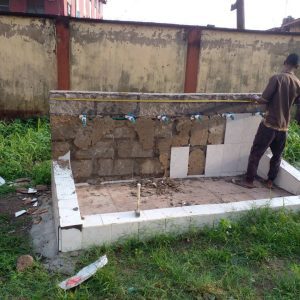
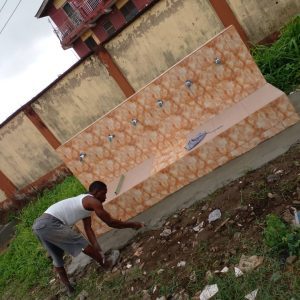
Restructuring the Education Sector is not easy-peasy
The struggle to create a linkage between the community members and LASUBEB was tedious at inception, and almost frustrated the efforts of HDI, but was mitigated with pieces of training and advocacy engagements.
Owasanoye explained that “the process of building the connecting bridge between the grassroots stakeholders and the government agencies such as the UBEC, LASUBEB, and LGEA was tedious and took a while.
“It costs us a combination of several pieces of training for the community groups, advocacy engagements with the government agencies and partnerships with other civil society groups and media was essential in supporting the grassroots efforts,” she said.
However, a working relationship has been established with LASUBEB and the community monitors have direct access to engage the Board, which has proved positive over the years.
To break any form of bureaucratic bottleneck subsequently, a WhatsApp group set up to collate on-the-spot monitoring reports and feedback has remained active till date and includes the Lagos State SUBEB Chairman and some key Board Members for prompt resolutions to concerns raised by the community volunteer education project monitors on UBE projects.
Another limitation of upscaling the initiative is the inability of HDI to train more community actors to enable them to conduct monitoring exercises in their localities.
Owasanoye also told BONews that funding has been a major factor hindering the expansion of the initiative to grassroot communities within and outside Lagos.
This story has been made possible by Nigeria Health Watch with support from the Solutions Journalism Network, a nonprofit organization dedicated to rigorous and compelling reporting about responses to social problems.

